Tony Rayns, the Not-So-Distant Observer

Trama
In the realm of film criticism, there exist voices that resonate deeply with the cinematic communities they serve. Tony Rayns, a distinguished critic, has long been one such voice, ardently championing Korean cinema throughout his illustrious career. A testament to his tireless dedication and unwavering enthusiasm lies in "The Not-So-Distant Observer," a film that distills Rayns' affection for Korean cinema through a series of poignant interviews with some of the country's most revered cineastes. The film embarks on a fascinating journey, traversing the realm of Korean cinema, and inviting the viewer to embark on a personal sojourn with Rayns as he navigates the country's vibrant filmic landscape. Through a series of intimate conversations, we are privy to the inner workings of the creative minds that have captivated audiences worldwide. Among the featured cineastes is JANG Sun-woo, a director whose distinctive vision has yielded a remarkable oeuvre of cinematic masterpieces. JANG's insightful dialogue provides a nuanced glimpse into the motivations driving Korean cinema's ascension to international acclaim. Next, we are introduced to LEE Chang-dong, a multifaceted talent who has etched his mark upon the industry through his mastery of both acting and directing. LEE's thoughtful reflections on the nuances of storytelling and the human condition showcase a deep empathy for his craft, illuminating the ways in which Korean cinema continues to push the boundaries of cinematic expression. The result is a rich tapestry of perspectives that reveal the profound influence of Rayns' critiques on these artists, fostering a deeper understanding of the symbiotic relationship between critic and creator. No discussion of Korean cinema's renaissance would be complete without an examination of the innovative director HONG Sang-soo, renowned for his innovative, often provocative explorations into the human experience. HONG's dialogue is imbued with a wry humor and a keen awareness of the complexities inherent in cinematic storytelling, offering a captivating glimpse into the inner workings of his creative process. Through conversations like these, the viewer is treated to an unparalleled opportunity to engage with the artistic visionaries who have captivated audiences worldwide. One of the most striking aspects of "The Not-So-Distant Observer" lies in its masterful interweaving of interviews and cinematic excerpts. Rayns' personal narrative serves as a deft unifying thread, linking a diverse array of artists, their films, and the critic's thoughts on their collective work. This fluid approach creates a dynamic, conversational atmosphere that underscores the collaborative nature of film-making. By doing so, the film invites viewers to consider the symbiotic relationship between critic and artist, challenging traditional notions of the authorial voice. Throughout its exploration of Korean cinema's remarkable rebirth, "The Not-So-Distant Observer" reveals the profound impact of Tony Rayns' critiques on the industry's growth. As a steadfast advocate for the diverse talents of Korean cinema, Rayns has helped shape the global perception of Korean film, fostering a new era of creative expression and challenging the notion that cinema is a solitary pursuit. The film is a poignant tribute to the enduring partnership between a critic and his subject, illuminating the intricate network of connections that bind creators and their craft. Ultimately, "The Not-So-Distant Observer" transcends its role as a simple tribute to Tony Rayns, elevating the cinematic landscape by underscoring the significance of the critic's role in nurturing the creative process. By offering an intimate exploration into the hearts and minds of Korean cinema's most celebrated artists, the film inspires a deeper appreciation for the rich tapestry of voices that comprise the global cinematic community.
Reseñas
Recomendaciones



